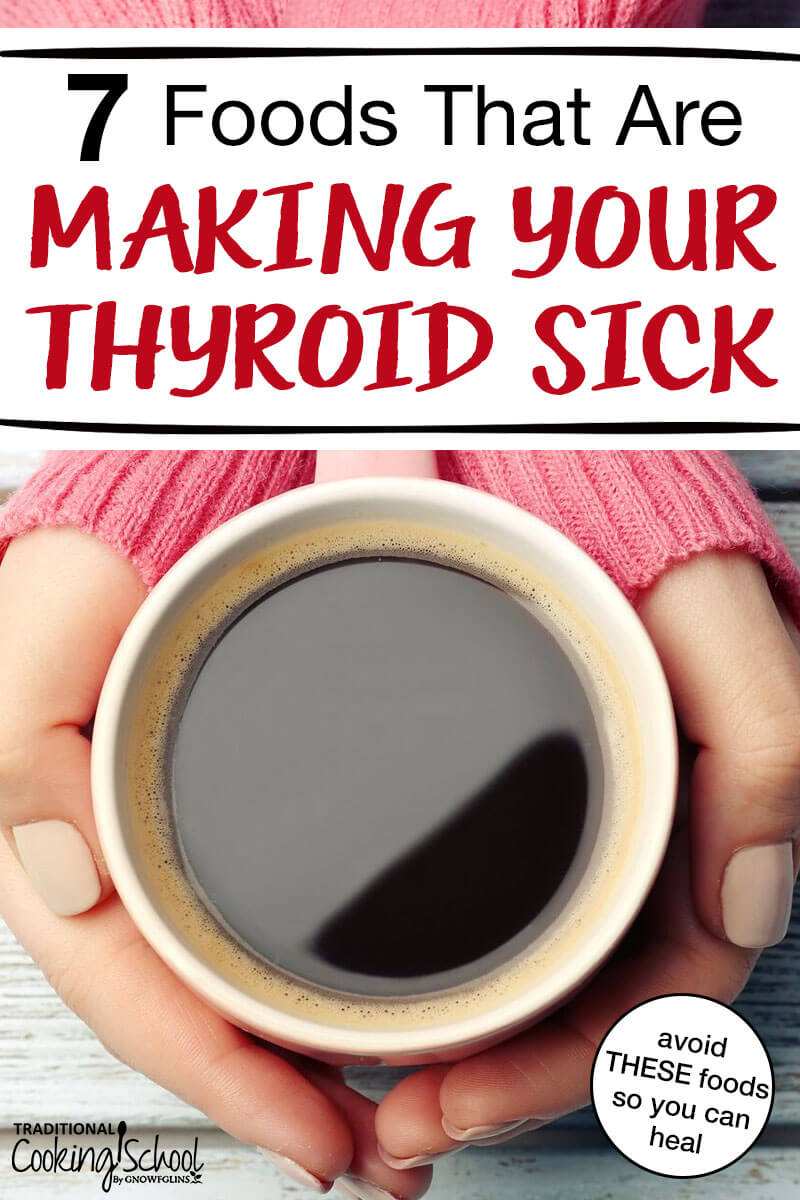
Of the over 20 million Americans suffering from thyroid disease, I’m sure most don’t think about their thyroid at the supermarket or their favorite restaurant…
Yet those are EXACTLY the places where, I daresay, thyroid health is most vulnerable.
Because within your beloved comfort food crackers or favorite restaurant salad dressing lurk the very foods making your thyroid sick.
If you already know about your thyroid problem, or if you’re already aware that thyroid disease runs in your family, has your doctor discussed diet with you at all? Unfortunately, allopathic and conventional medicine is typically content to throw pills at symptoms — rather than peeling back the layers to treat the heart of the problem.
Of these 7 foods that are making your thyroid sick, a few are found on this list as well: 5 Foods That Are Compromising Your Immune System. And it’s no wonder! Thyroid disease is almost always autoimmune in nature.
Remember…
Every cell in the body depends on thyroid hormones for regulation of their metabolism.
So if your thyroid is sick, your entire body will suffer.
7 Foods That Are Making Your Thyroid Sick
Nourishing your thyroid is a wonderful first step; however, you must also avoid the foods that make your thyroid worse. As you add foods that nourish the thyroid into your life, remove these foods too.
Food #1 — Soy
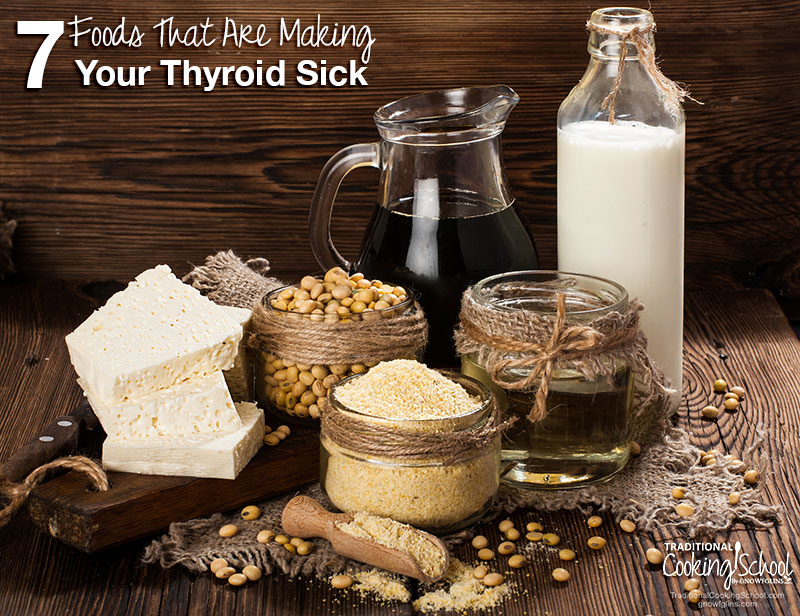
Years ago, Americans were urged away from tropical oils like coconut and palm oils and encouraged to begin using soy. It was touted as a health food — a perfect protein that could take the place of meat — and caused a rise in unhealthy vegetarian and vegan soy-based diets.
As a result, the soy movement began. And as is ever the case, money was behind it. Coconut palm trees simply don’t grow easily in the United States, so financial incentives were provided to soybean growers.
Soybean oil, texturized vegetable protein, tofu, margarine, shortening, soy milk, and cheap soy sauce flooded the market. Then, much to the demise of thyroids nationwide, saturated fats were demonized. Low-fat/unsaturated fat products and propaganda prevailed for several decades.
Their [polyunsaturated oils] best understood effect is their interference with the function of the thyroid gland. Unsaturated oils block thyroid hormone secretion, its movement in the circulatory system, and the response of tissues to the hormone. When the thyroid hormone is deficient, the body is generally exposed to increased levels of estrogen. The thyroid hormone is essential for making the ‘protective hormones’ progesterone and pregnenolone, so these hormones are lowered when anything interferes with the function of the thyroid. The thyroid hormone is required for using and eliminating cholesterol, so cholesterol is likely to be raised by anything that blocks the thyroid function. — Dr. Ray Peat (Source.)
Is Soy Still Around Today?
Absolutely. From restaurant food to breakfast cereal to bottled salad dressings to bread, it’s in everything. Look in protein bars, children’s snack foods, infant formula, mayonnaise, hummus, and potato chips — it’s there too.
Perhaps most disgustingly, soy is still proclaimed a healthy protein source. Upon walking into almost any health food store, one can find soy masquerading as chicken, cheese, sausage, and hot dogs.
Infants suffer from autoimmune thyroid disorders, leaky gut syndrome, and liver and kidney problems when they eat solely soy-based formula (source).
Soy can adversely affect thyroid hormone production as well as interfere with the uptake of synthetic thyroid hormones. Not to mention, almost all soy on the market nowadays is genetically modified, so it’s not even good for those with optimum thyroid function.
Like sugar, soy hides in places you’d never expect. For this reason, we always encourage you to make your own salad dressings and condiments, mayo, and other foods that contain soy when purchased from the store.
Action Step: Diligently read labels on every pre-made food you purchase. Place it back on the shelf if it contains soy in any form. Learn how to make your own healthier versions at home to save money and your health.
Food #2 — Grains, Especially Gluten
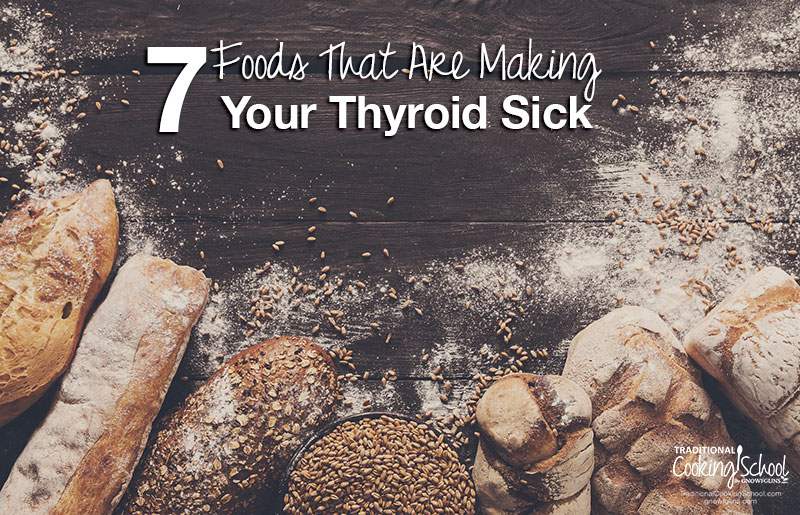
Grains provide the foundation of the modern American diet. Simply refer to the former USDA Food Pyramid and the current and slightly better My Plate, and you’ll quickly see that our government promotes a diet heavily comprised of wheat, corn, pasta, bread, rice, and other whole grain products.
Most of these products contain gluten — and there is strong evidence to support the link between gluten sensitivity/celiac disease and autoimmune thyroid diseases. The body recognizes gluten as a foreign invader, sends antibodies to attack it, and those antibodies attack the thyroid in the process. (Source.)
Hashimoto’s is one such autoimmune thyroid condition where gluten, and indeed most grains, are a big no-no.
Since most triggers of Hashimoto’s disease are dietary, most people if not all who have Hashimoto’s have increased intestinal permeability or leaky gut syndrome and impaired blood sugar metabolism. The best way to allow the intestine to heal, eliminate blood sugar swings, and to lose body fat is by avoiding all grain products and sweets. (Source.)
What About Going Gluten-Free?
Often, going “gluten-free” isn’t enough since so many gluten-free products are still highly refined and because many foods are cross-reactive. The body perceives these cross-reactive foods as it perceives gluten. Even though these foods are gluten-free, their protein structure is so similar to gluten that the body sends antibodies to fight them.
Gluten cross-reactive foods include coffee, dairy, milk chocolate, tapioca, soy, hemp, potato, and eggs. These grains are cross-reactive too: corn, oats, millet, sorghum, buckwheat, amaranth, quinoa, teff, and rice (source). All of those foods are technically gluten-free, yet the body reacts to them with an autoimmune response as if they were wheat, rye, spelt, or kamut.
Action Step: When giving up gluten doesn’t produce a drastic improvement in health, examining cross reactivity and eliminating ALL grains is the next step. In either case, grains should never be the foundation of anyone’s diet, especially someone with a thyroid condition.
Food #3 — Raw Cruciferous Veggies
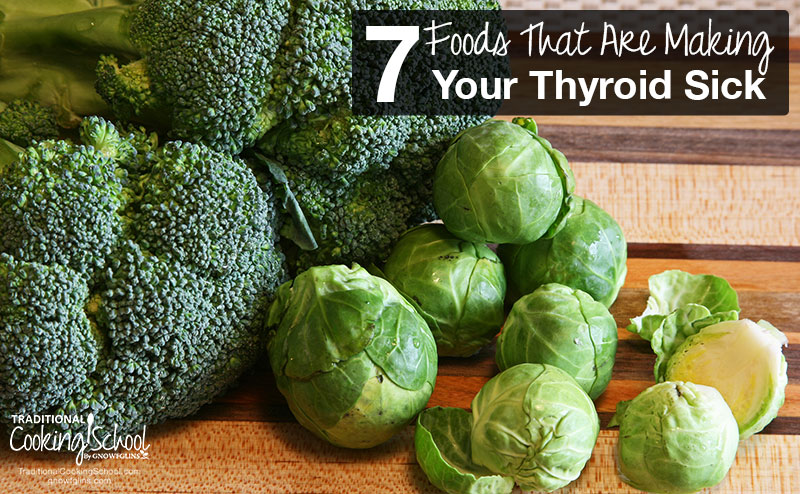
Sources differ on this topic. Many claim the benefits of raw cruciferous vegetables far outweigh the risks they pose to the thyroid. Still others claim the exact opposite — raw crucifers are goitrogenic and should always be cooked prior to consuming.
The cruciferous family of veggies is rich in sulfur-containing compounds called glucosinolates — detoxifying and anti-cancerous substances which are very beneficial to the whole body (source). Cruciferous vegetables are sometimes called brassicas and include:
- broccoli and cauliflower
- cabbage
- brussels sprouts
- radishes
- turnips
- bok choy
- kohlrabi
- kale and other leafy greens like arugula, watercress, mustard greens, and collard greens
And they should be a part of everyone’s diet, in my opinion.
Yet they are also goitrogenic in nature. A goitrogen is a substance that interferes with the thyroid’s uptake of iodine. When the thyroid isn’t uptaking enough iodine, it swells to try to uptake more iodine. This forms a lump in the throat called a goiter. Health practitioners should always palpate your throat area to check for a goiter, which is a sure sign of a thyroid problem.
Some argue, however, that though goiters are caused by interference in the uptake of iodine, that uptake isn’t blocked by food. Rather, they say, goiters are caused by inflammation from chronic autoimmune thyroid disease, such as Hashimoto’s. The solution, then, is to treat the autoimmune thyroid condition, not to remove goitrogenic foods like cruciferous veggies from the diet. (Source.)
So, Should Cruciferous Vegetables Be Consumed Raw Or Not?
That is the question.
I tend to sit in the better-safe-than-sorry camp. Though many trusted sources assure us of their safety, just as many warn against consuming raw crucifers.
Cooking deactivates the goitrogenic compounds in much the same way that steaming deactivates the oxalates in raw spinach and kale. These foods still contain copious vitamins and minerals, even after cooking, so I see no reason not to enjoy them cooked on a regular basis.
And it’s my personal opinion that they’re much tastier cooked as well. I mean… raw turnips or raw bok choy? I’d choose roasted broccoli over raw broccoli any day of the week! 😉
Action Step: Enjoy plenty of vitamin-rich cruciferous vegetables since they contain so many of the essential nutrients needed for proper thyroid function. Just limit raw consumption of them if your practitioner, doctor, or you feel they may cause you to develop a goiter.
Food #4 — Caffeine

Can you imagine starting your day without coffee?
If you can’t, that’s a good sign you rely on it for energy.
Caffeine dependence is detrimental to your thyroid and adrenal glands. Caffeine actually destabilizes blood sugar and masks your body’s signals that it needs rest. Once this cycle begins, it is very difficult to stop.
Even worse, did you know that caffeine blocks the absorption of thyroid replacement hormone? So if you already know you have thyroid disease and you take thyroid replacement hormone, like Armour or Synthroid, your morning cup of coffee is actually blocking those hormones from being absorbed! (Source.)
According to researchers, “Caffeine has been shown to markedly alter…thyroid stimulating hormone (TSH), and thyroid hormones in animal studies” (source).
Giving up caffeine can be harder than quitting sugar and gluten, combined. Believe it or not, caffeine is actually a drug — a very addictive drug because it stimulates the nervous system, providing a feeling of alertness and energy that might not be there otherwise (source).
What about decaf?
It’s a disputed area, but many health practitioners don’t suggest it for two reasons. For one, many manufacturers use a chemical process to remove caffeine from the coffee beans. The result is less caffeine, but more chemicals. (Source.)
Learning to live without this stimulant will benefit your thyroid’s function.
Action Step: Quit all caffeine. You can go cold turkey or titrate the amount you consume down over the course of days or weeks. Try these 12 Natural Energy-Boosting Drinks Without Caffeine or (my favorite) DIY Herbal Coffee Substitutes to replace your morning cup.
Food #5 — Sugar
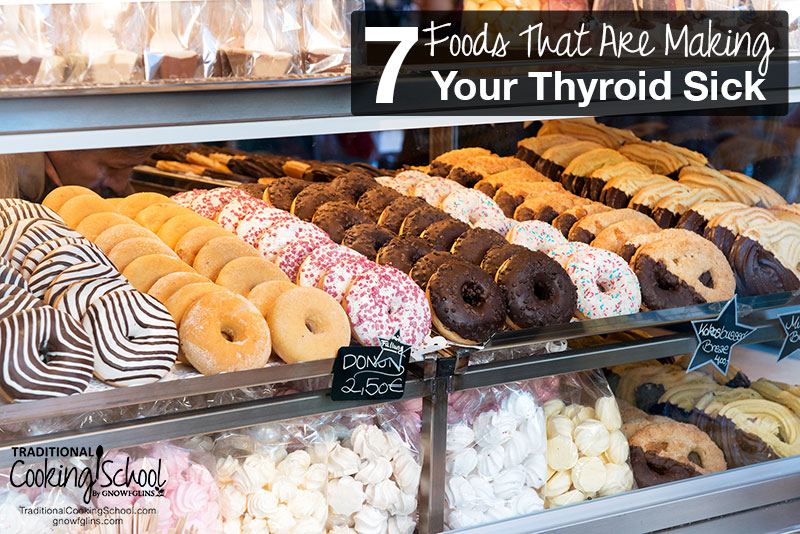
Unstable blood sugar and thyroid problems often go hand-in-hand. To maintain a balanced blood sugar, the thyroid must be healthy. To maintain a healthy thyroid, the blood sugar must be stable. You can’t have one without the other.
All forms of refined carbohydrates, especially from processed foods, require extra insulin to lower the drastic spike in blood glucose that these foods cause. Over time, this leads to insulin resistance — more insulin is required as the blood sugar becomes higher and higher. Hypoglycemia (low blood sugar) and insulin resistance are precursors to diabetes. Surprisingly, it all comes back to our hormones. When the blood sugar is out of whack, so are the hormones. And so, the vicious cycle goes…
Ironically, even someone with normal blood sugar can present with symptoms of hypoglycemia (dizziness, shakiness, fainting, headache, hunger, irritability) if they’re hypothyroid. The body’s cells aren’t sensitive to glucose, less glucose is absorbed in the gut, the response of insulin to lower blood sugar is slower, and it feels like hypoglycemia — even when it isn’t. The cells don’t get the glucose they need, so the body is in distress. The adrenals secrete the stress hormone cortisol. And thyroid function is further impaired. (Source.)
Let Me Clarify: What Does “Sugar” Mean?
To make things simple, let me clarify what I mean when I say “sugar”. Because I’m not just talking about white cane sugar — although that’s certainly included.
“Sugar” is the umbrella under which all sorts of refined, glucose-spiking foods fall:
- boxed breakfast cereals, granola bars, and “energy” bars
- candy, gummy treats, even health food store treats
- almost all pre-made snack foods, including cookies and chips
- sodas and energy drinks — even “natural” ones
- refined rice and pasta
- high fructose corn syrup
- commercial salad dressings and condiments
- and even whole sweeteners like honey, maple syrup, and coconut sugar for those with serious thyroid and/or blood sugar problems
Does Quitting Sugar Seem Impossible To You?
In this revealing article, Sarah Wilson, author of the book I Quit Sugar, shares her story of battling Hashimoto’s. She says,
Quitting sugar, quite frankly, is mandatory if you have an autoimmune disease. Sugar causes leaky gut (often cited as the precursor to autoimmune disease). Sugar inflames and mucks with the entire endocrine system and insulin spikes destroy the thyroid gland. In addition to the damage caused by insulin, a compromised thyroid gland will slow the removal of insulin from the bloodstream.
So if you have a thyroid disease and you earnestly want to heal, you MUST give up sugar in all its forms. You must be diligent to read labels in any prepared foods you buy because, truly, sugar is lurking everywhere.
If this seems impossible, believe me, I thought it was too. Until I did it. Now I can’t imagine sugar as a regular part of my lifestyle when I’m enjoying so many foods and even sweets without it! Here are some posts you may find helpful as you choose to heal naturally. Quitting sugar is a GREAT first step!
- 7 Tips For Overcoming Sugar Addiction
- Overcoming Sugar Addiction podcast
- Post-Holiday Sugar Detox In 4 Simple Steps
- Beyond Sugar: Overcoming The Withdrawal Symptoms Of No Sugar
- Pantry Staples For 21-Day Sugar Detox Success
Action Step: Begin phasing sugar, refined carbs, high-glycemic foods, and processed foods out of your diet. Read labels on any pre-made foods you buy and watch out for sugar in all its forms. Try stevia if you desire something sweet.
Food #6 — Fluoridated Water

Fluoride is a toxic drug linked with an array of potentially serious health problems. Most recently, research linking fluoridated water consumption to thyroid dysfunction received attention in both British and American media... Despite irrefutable evidence of harm, the United States still adds fluoride to municipal water supplies reaching nearly 211 million Americans. As of 2012, more than 67 percent of Americans receive fluoridated water. Of those, more than 11 million people receive fluoride at or above what has been deemed the ‘optimal’ level, according to the US Centers for Disease Control and Prevention (CDC). (Source.)
Fluoride is a major problem in the U.S. because our population is constantly inundated with a continuous supply of this toxic substance. Not only is it added to our drinking water, it’s also in our air. It’s in our toothpaste, and dentists urge us to get a fluoride treatment every time we sit in the dentist chair.
As cited in this Newsweek article, a study compared 2 cities in England. The city of Manchester didn’t add fluoride to its water; the city of Birmingham did. The researchers concluded that the doctor’s offices in Birmingham were twice as likely to report cases of underactive thyroid (hypothyroidism) than the doctors in Manchester.
But those 2 cities weren’t the only ones studied. In fact, this study covered 99% of England’s general medical practices. “Considering the comprehensiveness of this study—it covered nearly the whole of England—regional differences in fluoride intake or other confounding factors are unlikely to have played a role in the striking results” (source).
How Does Fluoride Damage the Thyroid?
In 4 ways…
- Iodine attaches to the amino acid tyrosine to then convert into T4 and T3. Fluoride slows this process.
- Fluoride “switches off” the uptake of active thyroid hormone (T4) into each cell.
- TSH stimulation by the pituitary gland is impaired because of fluoride causing a reduced output of thyroid hormones.
- Every cell in the body has a receptor site for TSH and T4. Fluoride competes for these receptor sites on the thyroid and in the cells, so the thyroid produces less thyroid hormone, and the cells receive less thyroid hormone. (Source.)
Action Step: Don’t drink tap water. Explore various water filtration options and choose one that removes fluoride from drinking water while retaining valuable minerals. Also, invest in shower head filters that remove both chlorine and fluoride from bathing water. Use natural, non-fluoridated dental products and refuse fluoride treatments at the dentist’s office.
Food #7 — Vegetable Oils
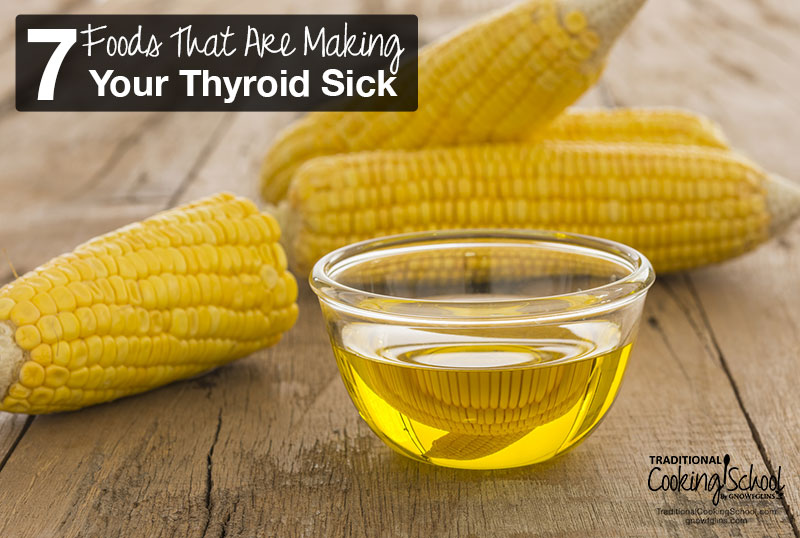
Though the rise in heart disease and obesity correlates with the rise in vegetable oil consumption and decrease in consumption of saturated fats, vegetable oils are still promoted as healthy fats. And people still believe it.
Vegetable oils — canola, corn, soybean, cottonseed, sunflower, safflower, and peanut — were non-existent until the 1900s when new technology and government subsidies provided these cheap fat substitutes.
How are vegetable oils made? I love this oversimplified description from Thank Your Body:
Find some “canola seeds.” Oh wait, they don’t exist. Canola oil is actually made from a hybrid version of the rapeseed… most likely genetically modified and heavily treated with pesticides.
Heat the rapeseeds at unnaturally high temperatures so that they oxidize and are rancid before you ever buy them.
Process with a petroleum solvent to extract the oils.
Heat some more and add some acid to remove any nasty wax solids that formed during the first processing.
Treat the oil with more chemicals to improve the color.
Deodorize the oil to mask the horrific smell from the chemical processing.
Of course, if you want to take your vegetable oils one step further, just hydrogenate it until it becomes a solid. Now you have margarine and all its trans-fatty wonder.
The healthiest cooking oils and fats are those which are obtained by churning (butter), pressing (olive oil, coconut oil, avocado oil), and rendering (tallow and lard). None of these are chemical extraction processes. They have been used for thousands of years to provide people worldwide with nutrient-dense fats for eating and cooking, and the process for producing them is still largely unchanged.
So, Why Are Vegetable Oils So Bad For The Thyroid?
2 words: polyunsaturated fats.
Polyunsaturated fats (or PUFAs) impair and slow thyroid function in 3 ways (source):
- They block the thyroid from secreting thyroid hormone.
- They block the transport of thyroid hormone through the bloodstream to the cells.
- And, they block the cells from properly utilizing the thyroid hormone that is available.
And I’ll throw out 2 more reasons:
- Vegetable oils sustain systemic inflammation. Remember, a sick thyroid is an inflamed thyroid.
- Vegetable oils are genetically modified, and who knows what GMOs are doing to our thyroids?!
Action Step: The only way to stop the inflammation and thyroid suppression that vegetable oils cause is to avoid them completely. Choose traditional, nourishing, unprocessed fats: butter, ghee, coconut oil, palm oil, tallow, and lard.
As you seek to treat your thyroid holistically, I highly recommend working with a functional medicine practitioner or naturopath to find a diet, supplements, and lifestyle that work for YOU. There is no one-size-fits-all approach to any disease.
Yet it is so interesting that the very foods that nourish the thyroid are some of the same nutrient-dense foods we talk about all the time at Traditional Cooking School. And the same foods that weaken your immune system are weakening your thyroid as well.
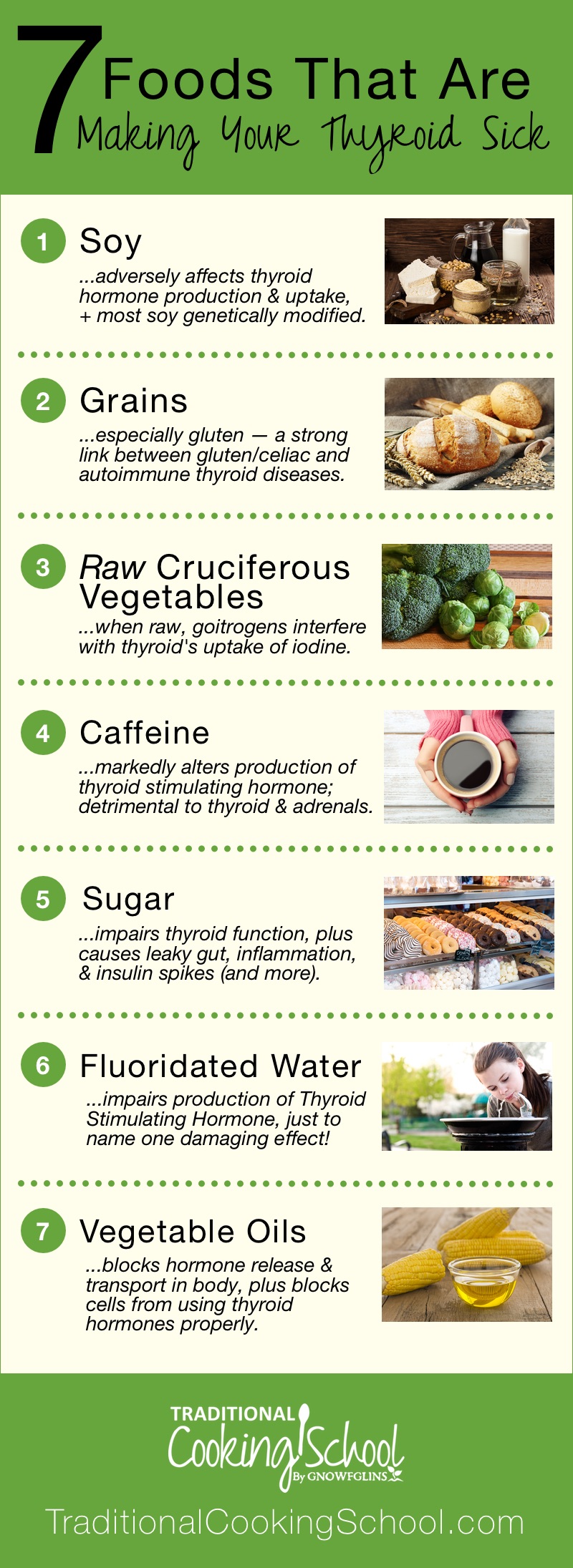
Please feel free to share this infographic image on Facebook, Pinterest, or Twitter! Hover over the image and easy share buttons will appear!
Are you dealing with hypothyroidism, hyperthyroidism, Hashimoto’s, or other thyroid disease? How is nutrition playing a role in your life?
More helpful articles related to supporting thyroid function:
- 5 Supplements To Consider Taking This Year
- Top 5 Supplements For Hashimoto’s
- Why & How To Use MCTs {reduce belly fat & improve thyroid function!}
- Top 5 Herbs For Thyroid Support
- Do Fermented Cruciferous Vegetables Like Sauerkraut Hurt The Thyroid? #AskWardee 063
- 7 Foods That Nourish Your Thyroid.
- 8 Reasons Why We’re Sick Even If We Eat Healthy
- Which Whole House Water Filtration System We Chose And Why #AskWardee 134
...without giving up the foods you love or spending all day in the kitchen!

2 free books:
Eat God's Way
Ditch the Standard American Diet, get healthier & happier, and save money on groceries...
We only recommend products and services we wholeheartedly endorse. This post may contain special links through which we earn a small commission if you make a purchase (though your price is the same).


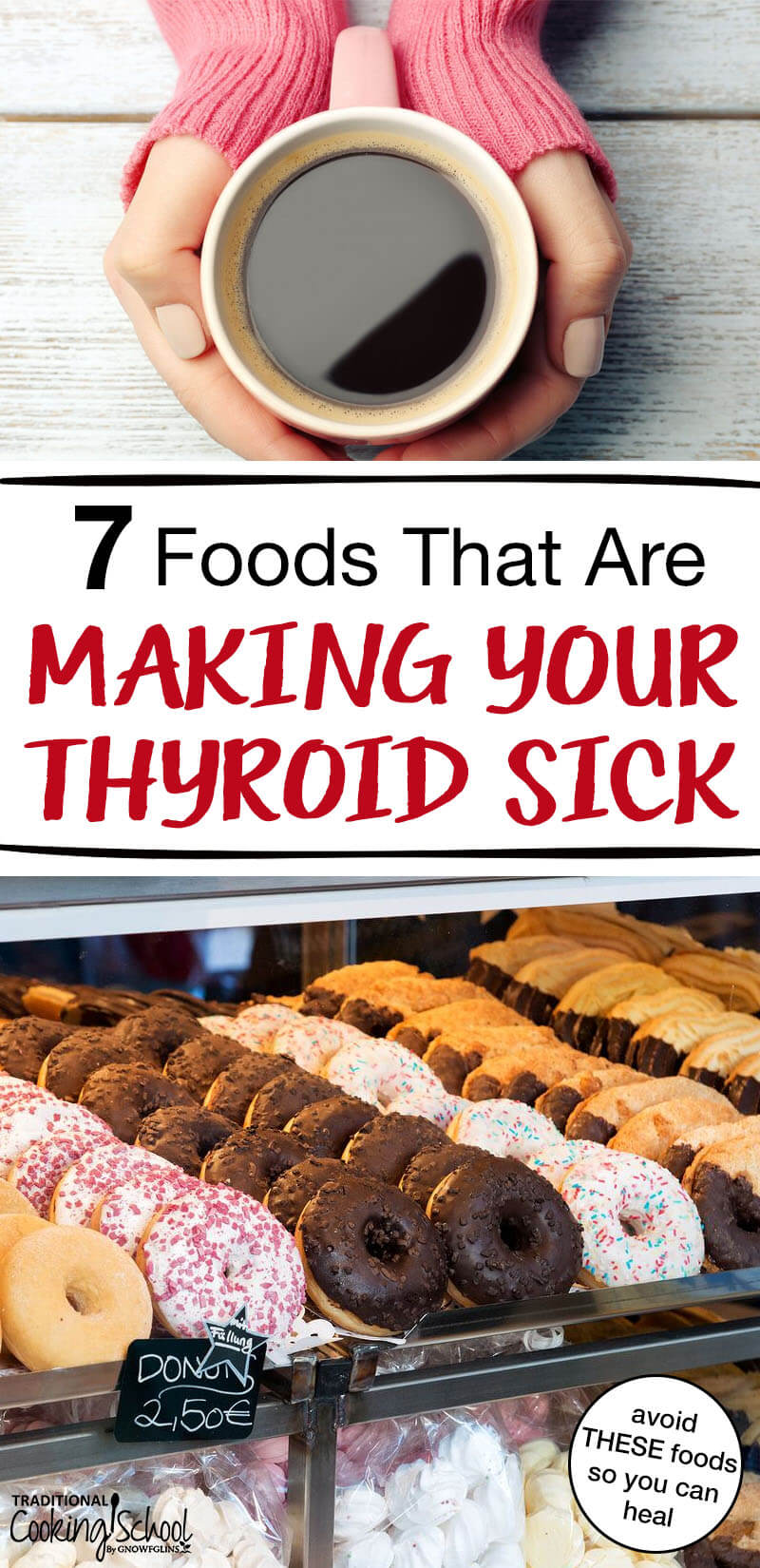
Gluten is as addictive as street drug opioids as it affects the same brain receptors.
Sugar also satisfies our brain’s reward centers in an addictive fashion.
Caffeine is just another drug we use as food.
All great points, Helene!
I loved this info,thank you,I have some changes to feel better
you said to use lard how would you use it in making cakes and browinies
Hi, I had to have my thyroid removed, I couldn’t swallow and had multiple masses on it. What do I do now?? I’ve been on synthesis but it’s not working….HELP
The page “foods that feed your thyroid” was not accessible. Can u help me find it?
Hi Teri — sorry about that! I’ve fixed the post and here is the correct link, as well: https://traditionalcookingschool.com/2017/01/09/foods-nourish-thyroid/
I am always amazed at the way food can disrupt our health or restore it. I have autoimmune disorders and I’m always paying attention to what irritates and what makes me feel well. Great post!
You’re so right, Brenda! Glad you enjoyed this post!
Thanks so much for this post, it’s so informational!
I need some advice regarding cooking oils. I mostly cook with non-gmo canola. I’ve noticed with many of these fats you recommended:
“Choose traditional, nourishing, unprocessed fats: butter, ghee, coconut oil, palm oil, tallow, and lard.”
I get immediate chest pain that I suspect is angina whenever i ingest them alone (non heated) or with healthy foods and meals. I even have this issue with avocado and olive oil and fatty foods like salmon and almonds and they don’t have to be large amounts. I do not have this reaction with canola oil which is why I stick with it.
I want to do what’s right for my body but I’ve also learned over time that’s it’s very important to listen to my body. Despite that, I’m still not sure what is more or less risky for my health in the long term. Any advice why this may be happening and what I should do? Thanks for any help!
It may be the acid burning your esophagus.
So…what’s left to eat? I don’t do well with beans at all. No coffee, no sugar, no grains, no dairy, no foods that react as if they’re gluten, nothing with chemicals or gmo. Seriously, what’s left other than a limited amount of vegetables?
Hi there! Since poultry is soy-based fed, is there any possibility that eating chicken breast or a lot of eggs can make a thyroid sick? I which way can soy components ‘travel’ in the chicken meat or eggs?
Forgive my bad English! I hope you understand the question.
Congrats for your blog, It has very good data!
hi there…soy being goitrogenic so even a vitamin e with soybean oil being the 2nd or 3rd item in it could cause harm to the gland? or a phosphatidylcholine capsule i have been taking with soybean oil to? and because it is in supp form would be even worst? could you also please email me with an answer just the same?
Hi Lindsey, love your write up on the 7 foods that are making your Thyroid sick.
All the vegetables that you had mentioned I liked them but don’t eat them .
But I thought kale is good for juicing and I had taken it twice.
So I have a question now, ghee,butter and such as recommended by you.
I love butter in daily cooking,and I am suffering from thyroid .
My doctor adviced me that it’s good to consume what I fancy, which I am careful and watch what I ate.
After reading your articles I have many questions.
I had dine My biopsy test and regularly done my follow up .
My doctor advice I don’t need pills or supplement to reduced the goiters. The only cure is to undego operation.
Regards
I have low thyroid I’m on a pill for it . I’m trying to learn what to eat but I also have ibs and I can’t do diary . I’m on a budge with 1 income . What foods can Ihave get that is healthy but cheap.
My thyroid has been under control for years with a supplement. Drink coffee daily, case by case basis not a blank check for all
Forefront health regularly recommends coffee with milk, sugar & tiny amount coconut oil! I drink one daily plus several normal percolated coffees. Helps & doesnt hinder.
Please, can you tell which supplement it is you are taking?
I was wondering where your citations are for this article? Or did I miss it?
Thank you!
Love the article but ,now I would like to have a list of what can I eat? After reading this I feel more confused and seems like there is nothing I can eat that won’t harm me. Ive had hashimotos since 1987 and have never been able to lose weight or get my thyroid under control on synthroid. Would even love a 1 week diet plan to see what I could eat. Thanks for your blog
Hello, I’m not sure if you will even see this, I have had Hashimoto’s for ten years, followed all kinds “diets”, couldn’t lose weight. About 4 years ago, I went whole foods plant based, ie. Potatoes, sweet potatoes, vegetables, legumes, healthy fats, oats, buckwheat, and other whole grains, nuts and seeds, fruits( lots of it) healthy sugars, ie. Coconut sugar, coconut aminos in place of soy sauce, and more. I went from 150lbs to 120lbs in quite a short amount of time. I’ve never gained anything back, and I eat unrestricted. There is massive research on how a plant based diet can heal your body. I am also gluten free. There are so many recipes now, and alternatives to dairy, some amazing plant based cheeses too? Its been amazing, and changed my life. Read the book How not to die, by Dr. Michael Gregor. There is so much information out there that doesn’t help, but the medical community doesn’t push plant based diets, because they know it heals, and you won’t need them as much. Hope this helps. Sending positive thoughts. ???
Thank you for this enlightenment, I’m gonna look for this book asap!!!!
I loved this info,thank you,I have some changes to feel better
What about rice bran oil? We’ve dumped soybean oil and using this alternative, pls pass your comment,
i would like to join support group as im also hypothyroid patient
I ‘m so mix up First one thing is good for you and then it’s not then you go on to another and find out that that’s not good also. I’m so mixed up that I don’t know what is good and what is bad anymore all I know is lately I’m not feeling the greatest I have a pouch, have lost my large intestine nine I also have a hiatus hernia and A lot of heartburn to the point where my oesophagus feels like it’s been burned With the bubbling up of acid. Just recently I’ve started to get really bad headaches. I am so lost just don’t know what to do anymore. Who to believe what to try and where to go. I would appreciate any help I can get. I think I’m lactose intolerant and glucose intolerant all in all I haven’t been feeling well for a while now. Do you think you could help me.
Thank you
Ann, yes, you need to start the Auto Immune Protocol diet! It will heal your leaky gut. Look it up and read all you can on it. The Palio mom blog is a good start.
Great book, “Eat Dirt, Dr. Josh Axe. Also, several Thyroid books I read: David Brownstein overcoming Thyroid Disorders, The thyroid Solution, Ridha Arem, M.D. Thyroid Healthy Suzy Cohen. I have read so many great ones. but, to get you started.^^
For oils, what are your thoughts on grape seed oil?
I don’t know when you wrote this, but I have had Hashimoto’s for 10 years, same situation, until 4 years ago, I went whol foods plant based, ie. Potatoes, vegetables, legumes, healthy fats, fruits ( lots of it) nuts, seeds. If you research it, there’s more on the list, tons of recipes too. I went from 150lbs, to 120 lbs in quite a short time period. There is a massive amount research showing that a plant based diet can reverse hashimoto’s and help the thyroid and all other diseases. Its been an amazing turn around for me. Hope this helps.
Thank you for sharing this information
hey here’s an idea take your thyroid medicine at night before you go to bed and you can still drink your coffee in the morning I’ve been dealing with these issues for years I disagree with a lot of what’s being said here I believe what works for one is not going to work for the other
I have been taking my thyroid meds at bedtime too for many years. It has always worked well for me.
I have hypothyroidism, diagnosed about 6 years ago. I also have diabetes in my bloodline. My gastronoligest thought I had Celiac before she did a biopsy. I have always had a hard time finding food to eat because everything I ate made me feel tired, groggy or just plain grouchy. Thank you for your page it has answered so many questions for me. I only have one more…. is natural yeast ok or not because of the grain?
We should be aware of the important points in this article as to how this 7 foods making thyroid sick. This would really mean a lot. Thanks for sharing this one out.
I went to a plant based diet years ago when I found out I had Colitis. It saved me! My doctors wanted to remove my colon and I told them no way. Every five years or so some doctor wants to remove this or that organ from me and I always tell them no. I just get back to natural foods and it helps a lot. Twenty years later I’m still here with everything in place. I’m continuing to learn and this site is very helpful. If I ever have questions about a protocol I just ask myself to follow the money.
Hi,
First, great article. Very helpful and informative! One thing I’m confused on is sugar. You refer specifically to refined sugar which I completely get, it has to go. But what is your opinion on sugar from healthy sources like fruit? Are those sources OK? And even more specifically, what about organic 100% fruit juices like White Grape, Honey Crisp Apple, etc.?
Thank you so much!
Hi, John.
All sugars can have an impact on the thyroid, even healthier options. Fruit juices, even if a healthy type provide sugar with little other nutrients.
Please consult with your natural doctor about your specific needs as we cannot give medical advice. 🙂
~Danielle, TCS Customer Success Team
Thank you for this post. It was very informative.